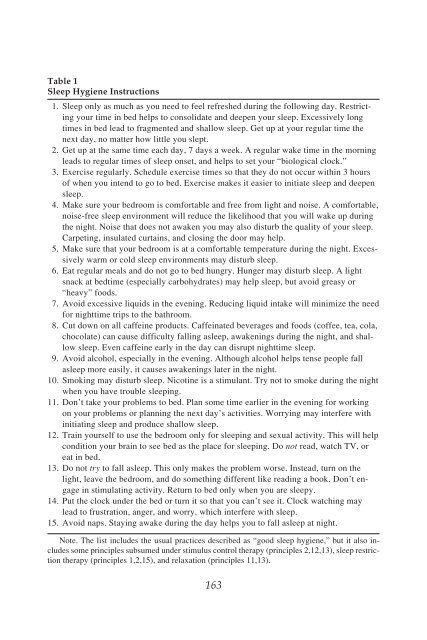Insomnia Insomnia
Insomnia Insomnia
Insomnia Insomnia
Create successful ePaper yourself
Turn your PDF publications into a flip-book with our unique Google optimized e-Paper software.
Cognitive-Behavioral Therapy 163<br />
Table 1<br />
Sleep Hygiene Instructions<br />
1. Sleep only as much as you need to feel refreshed during the following day. Restricting<br />
your time in bed helps to consolidate and deepen your sleep. Excessively long<br />
times in bed lead to fragmented and shallow sleep. Get up at your regular time the<br />
next day, no matter how little you slept.<br />
2. Get up at the same time each day, 7 days a week. A regular wake time in the morning<br />
leads to regular times of sleep onset, and helps to set your “biological clock.”<br />
3. Exercise regularly. Schedule exercise times so that they do not occur within 3 hours<br />
of when you intend to go to bed. Exercise makes it easier to initiate sleep and deepen<br />
sleep.<br />
4. Make sure your bedroom is comfortable and free from light and noise. A comfortable,<br />
noise-free sleep environment will reduce the likelihood that you will wake up during<br />
the night. Noise that does not awaken you may also disturb the quality of your sleep.<br />
Carpeting, insulated curtains, and closing the door may help.<br />
5. Make sure that your bedroom is at a comfortable temperature during the night. Excessively<br />
warm or cold sleep environments may disturb sleep.<br />
6. Eat regular meals and do not go to bed hungry. Hunger may disturb sleep. A light<br />
snack at bedtime (especially carbohydrates) may help sleep, but avoid greasy or<br />
“heavy” foods.<br />
7. Avoid excessive liquids in the evening. Reducing liquid intake will minimize the need<br />
for nighttime trips to the bathroom.<br />
8. Cut down on all caffeine products. Caffeinated beverages and foods (coffee, tea, cola,<br />
chocolate) can cause difficulty falling asleep, awakenings during the night, and shallow<br />
sleep. Even caffeine early in the day can disrupt nighttime sleep.<br />
9. Avoid alcohol, especially in the evening. Although alcohol helps tense people fall<br />
asleep more easily, it causes awakenings later in the night.<br />
10. Smoking may disturb sleep. Nicotine is a stimulant. Try not to smoke during the night<br />
when you have trouble sleeping.<br />
11. Don’t take your problems to bed. Plan some time earlier in the evening for working<br />
on your problems or planning the next day’s activities. Worrying may interfere with<br />
initiating sleep and produce shallow sleep.<br />
12. Train yourself to use the bedroom only for sleeping and sexual activity. This will help<br />
condition your brain to see bed as the place for sleeping. Do not read, watch TV, or<br />
eat in bed.<br />
13. Do not try to fall asleep. This only makes the problem worse. Instead, turn on the<br />
light, leave the bedroom, and do something different like reading a book. Don’t engage<br />
in stimulating activity. Return to bed only when you are sleepy.<br />
14. Put the clock under the bed or turn it so that you can’t see it. Clock watching may<br />
lead to frustration, anger, and worry, which interfere with sleep.<br />
15. Avoid naps. Staying awake during the day helps you to fall asleep at night.<br />
Note. The list includes the usual practices described as “good sleep hygiene,” but it also includes<br />
some principles subsumed under stimulus control therapy (principles 2,12,13), sleep restriction<br />
therapy (principles 1,2,15), and relaxation (principles 11,13).<br />
163


